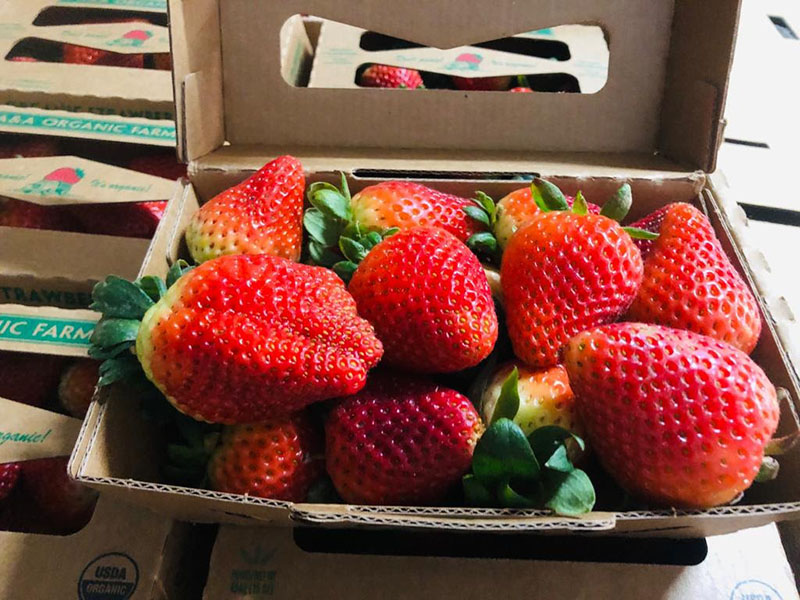Reeling from another round of storms, California growers fight to recover farmland from flooding

California residents, farmers and ranchers have endured two intense storm systems in recent months that brought significant rainfall, snow and flooding to many areas. Storm-ravaged Californians are now bracing for another round of late-season weather with potentially more rain, wind and flooding in the central and southern parts of the state, according to the National Weather Service.
What does this onslaught of extreme weather mean for California growers kicking off their spring growing season?
“Farmers in the Salinas Valley were picking up the pieces from January’s flood event when hit by the March storm and subsequent flooding,” Chris Valadez, president of the Grower-Shipper Association of Central California, told The Packer. “We also know some areas didn’t suffer direct flooding in January that flooded this time around; thus, the number of acres flooded will be more significant.
“People are hurting,” Valadez continued. “An extraordinary effort has been and remains underway to pick up the pieces from not one but two successive devastating flood events that impacted farms, farmworkers and the services sector that depend upon a viable, operating agricultural economy.”
Related news: California Strawberry Commission shares update on devastation from river flooding
President Joe Biden, at the request of California Gov. Gavin Newsom, recently declared a state of emergency for 43 counties across the Golden State and is working to provide economic relief to the farm and food workers who need it, regardless of immigration status and storm damage.
“These farmers are highly resilient and will come back stronger,” said Valadez said.
What to expect out of California fields this spring
The tenacity and determination of growers notwithstanding, it’s inevitable that the back-to-back storms will affect what growers are able to harvest and ship in the weeks ahead.
“Weather has very much hurt our Salinas-area growers, with delays and disaster meaning lost fields due to flooding and other setbacks,” Andy Martin, president of A&A Organic Farms, told The Packer.
Not only is it challenging to farm under storm and flood conditions in much of California right now, once harvested, transporting perishable produce through the state could be hindered.
“Business is also off due to all the road closures from the excess water and flooding,” Martin said.

Flooding events have caused an issue not often seen in California in recent years: oversaturated soil. After so much precipitation, farmland across many parts of the state is like a sponge that has soaked up all the water it can possibly hold.
“Many Salinas-area spring and summer plantings were washed out or not planted because it was too wet. We could see some shortages of some products in a few weeks,” Martin said.
In the meantime, the Watsonville-based A&A Organic Farms is leaning on its strong supply of organic tomatoes, strawberries, bell peppers, oranges and garlic from Mexico while its California growers recover. Not all the organic grower’s California produce has a gap, however, as Martin said A&A Organic Farms has a supply of turmeric available from Santa Cruz County, Calif. along with its Fiji-sourced turmeric.
Where consumers will likely see shortages
“Leafy greens harvest season generally starts in April and May in the Salinas Valley,” April Ward of the California Leafy Greens Marketing Agreement told The Packer. “January and March rains and flooding will likely have an impact on supply in the spring and early summer.”
Valadez from the Grower-Shipper Association of Central California believes the majority of Salinas Valley lucked out this time. In early March 2023, the Salinas River that runs through the center of the valley carried more water than it could handle within its channel, forcing water to move laterally into adjacent agricultural areas, he said.
“More than three-quarters of all crop acres were not flooded,” he continued. “So, you will see crops harvested and shipped from the Salinas Valley for the spring harvest.”
Related news: From fresh berries to lettuce, what we now know about potential California crop losses from flooding
However, it’s not all good news for Salinas Valley growers.
“Many farms have suffered damaging flooding and, unlike the January flood, had crops planted and suffered direct crop losses. Therefore, economic damages are likely to be more significant when compared to the impacts tallied from the January flood event,” Valadez said.
How the industry can support growers dealing with disaster
“Our growers are resilient and fight hard to keep the food coming for us to sell. We appreciate all the support our customers give to them,” said Martin of A&A Organic Farms.
“The LGMA and other organizations have been providing growers and shippers with a variety of resources to help them navigate the situation,” Ward said. “Specifically, LGMA has provided food safety resources related to flooding, including a webinar featuring Dr. Trevor Suslow and a fact sheet outlining steps to take.”
Valadez says individuals wishing to further support the California farm and grower community can donate to The Community Foundation for Monterey County’s storm relief fund.
“[You] can designate relief to victims from this flood event and specify funding towards exact areas, like immediate [or] basic needs — which include clothing, diapers and wipes — and personal care products, as well as help with immediate financial needs,” he said.
The Grower-Shipper Association of Central California also has partnered with Clinica de Salud Del Valle De Salinas to provide shelter to residents from flooded areas, Valadez said. This includes residents in the farmworker community of Pajaro, where the association and the health care provider are actively providing “medical care, including general screenings, as well as medication replacement for those who were forced to evacuate their homes quickly to escape fast-rising water.”
“GSA was recently awarded an emergency grant to help with medical care for farmworkers, including those impacted by recent storms. GSA thanks Clinica for continuing to partner with us as we work to achieve our mission of advancing families, food and farming in our region,” Valadez said.







